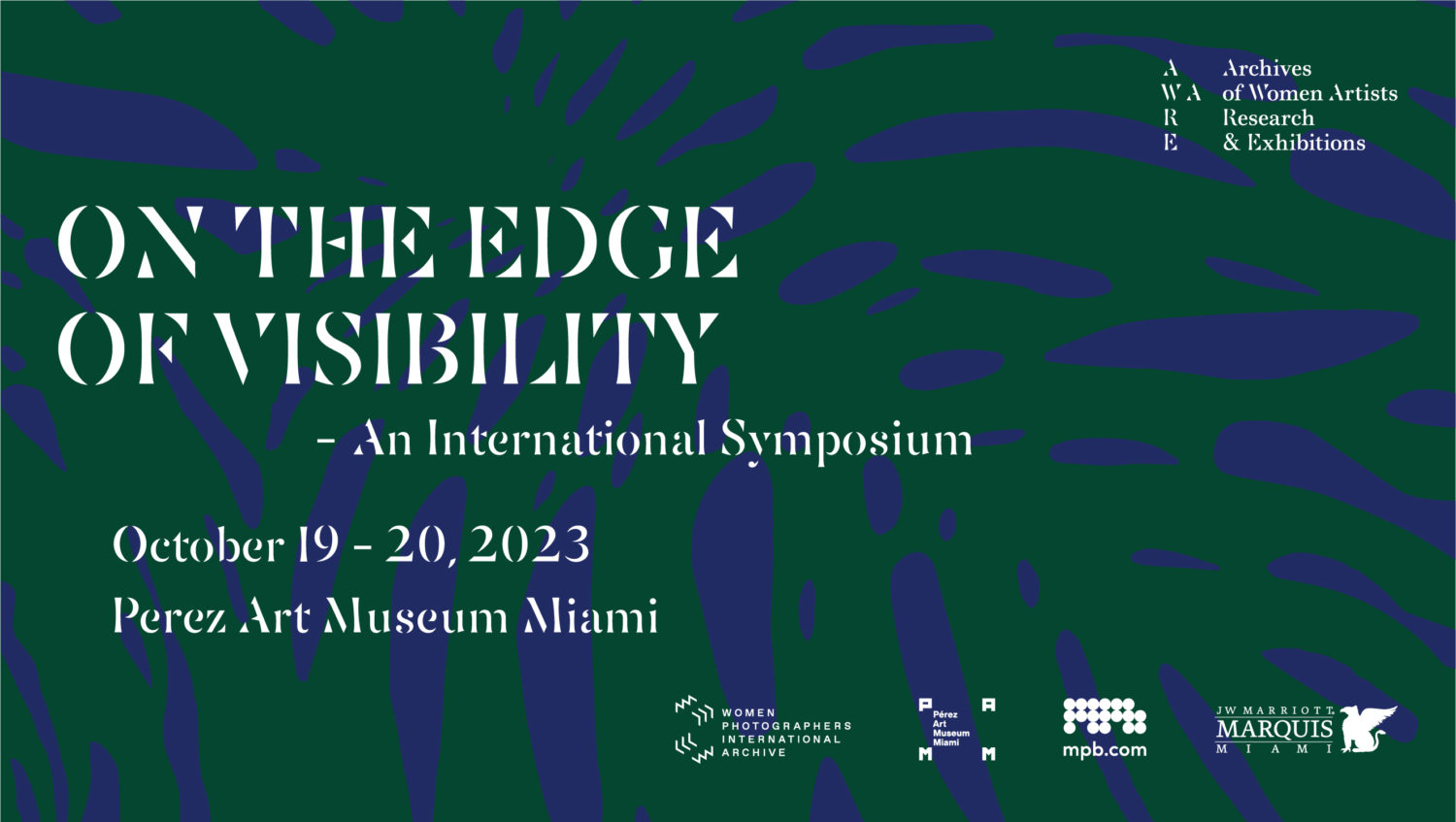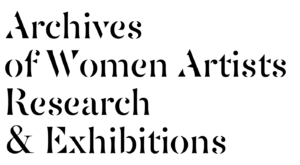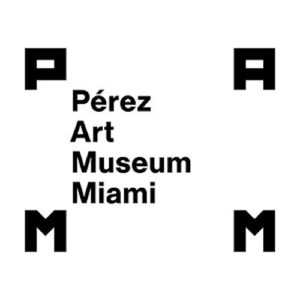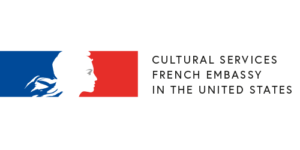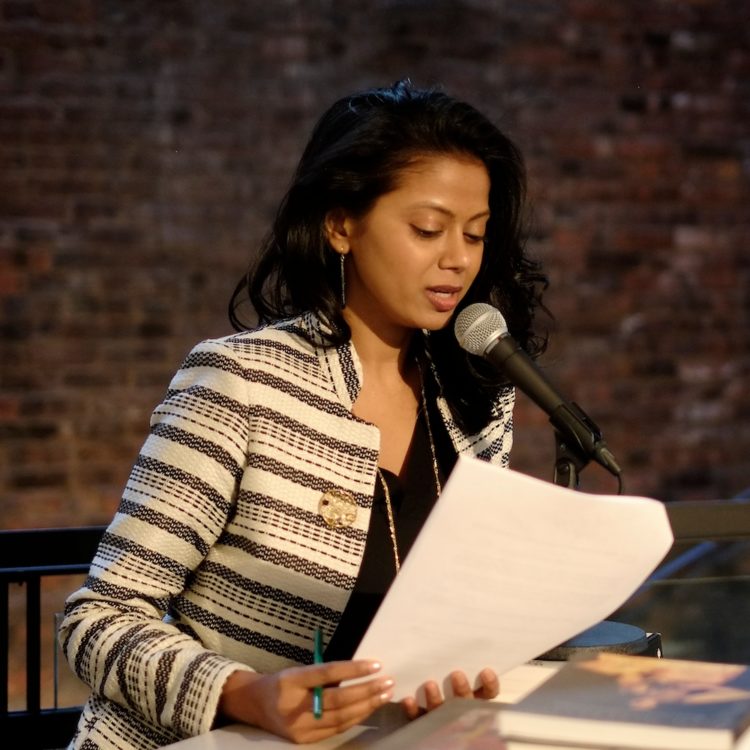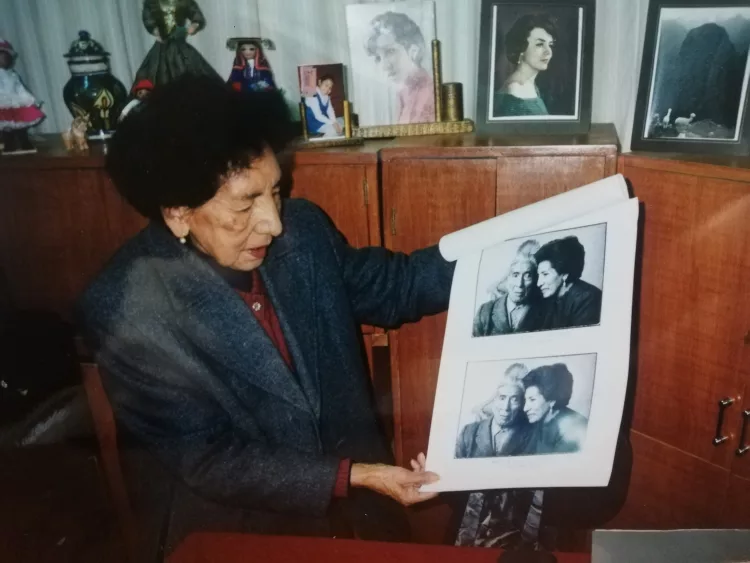Symposium
© Francisco Maso, AWARE
AWARE: Archives of Women Artists, Research and Exhibitions and Women Photographers International Archive (WOPHA) in partnership with Pérez Art Museum Miami (PAMM) organize On the Edge of Visibility – An International Symposium focused on Black and Indigenous women1 and non-binary artists, with special focus on photographic practices2 within three broad geographical zones: Latin America, the Caribbean, and the United States.
Offering a transcontinental approach and encompassing postcolonial, feminist, and queer perspectives, this symposium considers the concerns and complexities of what it means to be a Black or Indigenous woman artist within different cultural settings. It also constitutes a reflection on past and current modes of knowledge creation.
By exploring the notions of visibility and invisibility as they relate to visual practices and dominant power structures, this symposium aims to examine proposed strategies of resistance as a means of reclaiming visual agency. It will therefore seek to challenge existing academic boundaries – notably within the history of art and photography – through a multiplicity of voices and perspectives, questioning contemporary discourses and their genealogies, and considering the future of the disciplines.
The event will be livestreamed and translated to Spanish, Haitian Creol and sign language.
Practical information
19 and 20 October 2023
The Pérez Art Museum Miami
Woman is used in this context for a person, who regardless of their gender assigned at birth, identifies as a woman.
2
Photographic practices include but are not limited to creating images with or without cameras, automated and computational processes, augmented photography, and collecting, archiving, or circulating images.
Pérez Art Museum Miami
Marie Vickles, Aldeide Delgado and Nina Volz
Marie Vickles is the Director of Education at the Pérez Art Museum Miami and Curator-in-Residence at the Little Haiti Cultural Complex. She has curated over 30 exhibitions in different contexts since 2003, with a focus on Black contemporary artists in South Florida, and organized arts education programs, workshops, and exhibitions across the U.S. and Caribbean for over 15 years. In her work, Vickles seeks to develop new ways to bridge the connections between creativity and community engagement.
Aldeide Delgadois an art historian and curator, founder & director of Women Photographers International Archive (WOPHA). She conceptualized the world’s first-ever feminist photography collective conference, WOPHA Congress: Women, Photography, and Feminisms (November 17-20, 2021). She publishes and curates from feminist and decolonial perspectives on crucial topics of the history of photography and abstraction within Latin American, Caribbean, and Latinx contexts. Prior to founding WOPHA, Delgado created the online feminist archive Catalog of Cuban Women Photographers, the first comprehensive survey of Cuban photography history highlighting women’s contributions from the nineteenth century to the present.
Nina Volz, AWARE, Head of International Development
Iberia Pérez González, Andrew W. Mellon Caribbean Cultural Institute Curatorial Associate at PAMM
Iberia Pérez González is the Andrew W. Mellon Caribbean Cultural Institute Curatorial Associate at PAMM. She received a Ph.D. in Art History and Theory from the University of Essex, and an MPhil in Contemporary Art in a Global Perspective from Leiden University. Her interdisciplinary research engages with contemporary art and visual culture in Latin America and the Caribbean, with a focus on artist-led initiatives and networks, and the intersection between art, politics, and the environment.
The 2023 CCI + WOPHA Fellowship program welcomes emerging to mid-career women and non-binary photographers of African and/or Indigenous heritage based in Miami, the Caribbean, or its diasporas. During the fellowship period, Farihah Aliyah Shah continues two ongoing bodies of work by researching collective resistance, archival preservation, and the role of the matriarch in the Guyanas.
This lecture is presented thanks to generous support from The Caribbean Cultural Institute (CCI) at Pérez Art Museum Miami.
Farihah Aliyah Shah is a contemporary lens-based artist originally from Edmonton, Alberta and now based in Bradford, Ontario. Using photography, video and sound installation, her practice engages photographic history and explores identity formation through the colonial gaze, race, connectivity to land and collective memory. She is also the co-founding member of Mast Year Collective. Shah has exhibited internationally in Asia, Europe and North America.
Donette Francis is director of the Center for Global Black Studies and an Associate Professor of English at the University of Miami. Her research and writing investigate place, aesthetics, and cultural politics in the African Diaspora. Professor D. Francis is the author of Fictions of Feminine Citizenship: Sexuality and the Nation in Contemporary Caribbean Literature. She is currently completing Creole Miami: Black Arts at the Hemispheric Crossroads, a sociocultural history of Black arts practice in Miami from 1970s to present.
Moderator: Louise Thurin, AWARE Project Coordinator
Fractals of Invisibility questions the historical and structural reasons for the exclusion of Black and Indigenous women artists from art historical narratives. It examines invisibility as an intersectional phenomenon rooted in colonial and contemporary history.
Louise Thurin is a cultural activist and author specializing in contemporary African and Afrodiasporic art. She is a project coordinator at AWARE: Archives of Women Artists, Research & Exhibitions for “The Origin of Others: Rewriting Art History in the Americas, 19th Century–Today”. She is also the Artist Residency Coordinator and co-Curator of the Biennale Internationale de Sculpture de Ouagadougou (BISO) and has notably been involved with UNESCO’s Routes of Enslaved Peoples and Franco-Cameroonian NGO Fondation Jean-Félicien Gacha.
Ariadna Solis
This proposal aims to show some reflections compiled throughout the process of curating and exhibiting “Lhall xallona llun lliu’tuse, llunen lliu walh / Dressing is also a territory of struggle” which took place at the Textile Museum of Oaxaca and at the San Pablo Cultural Center from October 2022 to March 2023 in the city of Oaxaca, Mexico. Through archival material, textile objects such as huipiles or rag dolls, contemporary photography and educational material, the proposal focused on the need to delve into the museum and collectively experience the ‘re-write’ and the ‘re-right’, in the words of Linda Tuhiwai, of our stories through textiles, stories that intersect with experiences of dispossession, migration, extractivism and exoticization of our corporalities. This proposal will allow me to address some reflections in relation to the contradictions in the appropriation of historically colonial spaces such as museums, the curatorial translations of academic research as collectively gestated narrative strategies, and the proposals made from our concerns and desires.
Ariadna Solis is a Yalalteca woman, a second generation Zapotec migrant. She is a political scientist and art historian. She is dedicated to research, writing, teaching and different textile work. She is part of the Dill Yel Nbán collective, a group for the transmission and dissemination of the Zapotec language and culture.
Amalia Caputo
This article critically examines the complexities surrounding racial democracy in Venezuelan photography, focusing on selected Venezuelan Women Photographers. It argues that the myth of Venezuelans as “Café con leche” and the historical ideology of whitening have hindered intersectional discussions on gender, blackness, and indigenous identities. Through an analysis of specific bodies of work, the study reveals the lasting influence of this ideology on the self-perception of contemporary women photographers. Additionally, it highlights photographers like Thea Segall and Barbara Brändli, who observed and studied indigenous cultures in depth. The article acknowledges the impact of Venezuela’s political and social crisis on the development of feminist issues within photography. It concludes that Venezuelan women photographers still face significant challenges that require attention and resolution.
Amalia Caputo is a visual artist, art researcher, writer, editor, curator, and educator. She is currently a PhD Candidate at Universitat Oberta de Catalunya and obtained her MA from New York University/International Center of Photography in 1995. Her work focuses on the intersection of womanhood, nature, and feminism. She explores topics such as permeable landscapes, the natural world, photography in the digital age, and historical omissions related to women, particularly in the context of Venezuela and Latin America. A. Caputo lives and works in Miami since 2003.
Alejandra López-Oliveros
The series ‘Mestiza’ by Citlali Fabián shares similarities with photographs by Graciela Iturbide and Flor Garduño. Their black and white photographs all center on the figure of an Indigenous woman, wearing a headpiece that gives her a regal and mysterious air. As an Indigenous (Yalalteca) photographer, however, her practice differs from that of the other two photographers. In this presentation, A. López-Oliveros analyzes how C. Fabián’s contemporary practice dialogues with the colonial legacy in Mexico, and how race, class, gender and the history of photography (including G. Iturbide and F. Garduño’s practices) have influenced her approach. More specifically, how do the colonial legacy and ethnographic use of photography reverberate in this series? How have these photographs increased Indigenous visibility, and in what way? Comparing the photographs, A. López-Oliveros raises a debate on identity politics and the photographers’ positionality and argues that her approach is one of feminist Indigenous resistance.
Alejandra López-Oliveros is a PhD Art History student at Rutgers University. She studies contemporary photography from the Americas in connection with feminist, decolonial and queer studies. She previously studied at the Institute of Fine Arts, NYU, the University of Leicester and the University of Granada.
Claudia Holgado Chacón
Julia Chambi (1919–2003) was a Peruvian photographer and visual artist who faced and escaped the power schemes of her time, becoming not only an inexhaustible and multidisciplinary creator, but also a cultural and political manager who actively participated in the promotion of the arts, especially in southern Peru. She began her photographic activity at a very early age, collaborating in the studio of her father, Martin Chambi; in addition to this, she provided graphic input into various local media or institutions while building her own photographic portfolio. Julia Chambi also emerged as a cultural manager with an important role in the promotion of artistic expressions from Cusco. Her life story, her work and the context in which she lived form the central objective of this biographical research process. It seeks to collect information, gather memories and re-signify stories to recognize her as one of the first Andean and Peruvian photographers.
Claudia Holgado Chacón is a photographer and a researcher of Andean descent, from Cusco. She has a degree in Communication for Development from the Pontificia Universidad Católica del Perú, a Master’s Degree in Visual Arts and Education from the University of Barcelona and in Documentary Photography from the Image Center (Lima, Peru). She is a professor at the communications department of the Pontifical Catholic University of Peru, has been a communication consultant for UNICEF, and is currently developing research and a documentary short film based on the life and work of Julia Chambi, her great-aunt.
Special program
Myriam Mihindou was born in Gabon. Franco-Gabonese, she bases her artistic experimentation on the notion of boundaries. As a nomad, she makes spaces her own, embodying them, showing us states of transition that are both initiatory and cathartic. The question of the body is then linked to memory, identity, and territory. A “trans-emotional” production with a political dimension, Mihindou’s body of work takes us beyond tangible limits.
AWARE prizes were created in 2016 to reward the work of women artists linked to the French scene, to respond to the lack of visibility in France and abroad, and to highlight their works and the longevity of their careers, beyond all stereotypes. The prizes reflect AWARE’s mission to shine a light on women artists of the 19th and 20th century. Each year, two prizes are awarded: the Nouveau Regard prize to an artist in the middle of her career, and the Outstanding Merit prize, to an artist with a career spanning over 40 years or more.
Myriam Mihindou is currently resident at the Villa Albertine, in partnership with A.I.R. Gallery and AWARE. Reinventing artists’ residencies, Villa Albertine is creating a network for arts and ideas spanning France and the United States. It offers tailor-made residencies for global creators, thinkers and cultural professionals.
Pérez Art Museum Miami
Crystal Whaley, Writer & Director of The Sound She Saw (2022)
Crystal Whaley is a director and multiple EMMY award-winning producer with over 20 years of experience, specializing in production, creative direction and development. She has produced nationally syndicated and Peabody-nominated documentaries and TV series for TLC, Sesame Workshop, Showtime, MSNBC, Frontlines/PBS and Netflix. She is a member of the Producer’s Guild of America (PGA).
Crystal Whaley, director
The Sound She Saw (2022) is a documentary feature film featuring Black women photographers inspired by the critically acclaimed photo book Viewfinders: Black Women Photographers (1985).
The Politics of Visibility examines what strategies are effective in gaining institutional recognition and achieving socio-political goals. This section questions the creation and replication of stereotyped representations of Black and Indigenous woman and non-binary artists within the dominant discourse.
Candice Jansen, Marielle Plaisir, Michelle Lisa Polissaint and Crystal Whaley
Candice Jansen is a memorist whose practice in photography is archival and Black-conscious. She studied the life and works of photographers Cedric Nunn and Ernest Cole in her dissertation, Coloured Black (2019), completed at WiSER Wits Institute for Social and Economic Research. She served as Curator of Research and Exhibitions at the Market Photo Workshop in Johannesburg (2019–2021) and is editor of Black Photo Libraries (2021), a research collection on South African photographic legacies. Currently, she is a New Archival Visions Digital Curatorial Fellow at the Centre for Humanities Research at the University of the Western Cape.
Marielle Plaisir, a multimedia artist and activist currently residing in Miami. Her artistic outcome revolves around the theme of social domination, delving into subjects like colonialism, race, and class. M. Plaisir’s work serves as a “research laboratory” that draws from a wide array of global documentary history, literature, and sound sources, transforming them into impactful visual experiences. Through her interdisciplinary approach, she sheds light on how acts of domination and power shape social relationships in the context of globalization. Among her accolades, she was honored with the Knight Foundation Knew Work award in 2022 and the Southern Prize and State Fellowship in 2021.
Michelle Lisa Polissaint is a Haitian-American visual artist, arts organizer, and consultant based in Miami, Florida. She holds a Bachelor of Fine Arts degree from Florida International University in Photography and Fiber-based painting with a minor in Art History. She is a current studio resident at Bakehouse Art Complex in Miami, Florida.
Crystal Whaley is a director and multiple EMMY award-winning producer with over 20 years of experience, specializing in production, creative direction and development. She has produced nationally syndicated and Peabody-nominated documentaries and TV series for TLC, Sesame Workshop, Showtime, MSNBC, Frontlines/PBS and Netflix. She is a member of the Producer’s Guild of America (PGA).
Moderator: Aldeide Delgado, WOPHA Founder & Director
The Poetics of Opacity focuses on the notion of “opacity”, as theorized by philosopher and poet Edouard Glissant, understood as an impenetrable alterity that cannot be possessed, an epistemological notion that grants everyone the right to keep their psycho-cultural selves. It will examine the potential of this concept as an alternative to Western ways of understanding, representing and recognizing Black and Indigenous women and non-binary artists.
Grace Aneiza Ali
In the last decade, there has been an emergence of artists who have committed their artistic practices to elevating the voices of women from Guyana and its expansive diaspora. They are countering a dangerous single story of Guyana rooted in catastrophe, violence, political corruption, poverty, trauma and a mass migration exodus. Through a curatorial activism lens, I trace how a new generation of Guyanese women artists confront the politics of invisibility, erasure and exclusion. I unpack how, in the face of global misrepresentations and exoticifications, these artists claim visual agency and lean on their creative imaginations to tell Guyanese women’s stories anew. Working within the history of art and photography, I explore how they are part of a growing contemporary movement to disrupt reductive narratives and echo a call to action that Guyanese women should no longer remain on the edge of visibility.
Grace Aneiza Ali is a Curator and Assistant Professor in the Department of Art and Art History’s Museum and Cultural Heritage Studies at Florida State University. She is Curator-at-Large for the Caribbean Cultural Center (New York) and Editor-in-Chief of the College Art Associations’ Art Journal Open. Her book, Liminal Spaces: Migration and Women of the Guyanese Diaspora explores the art and migration narratives of women of Guyanese heritage.
Heather Diack
Photography resembles family: both are mutable, shifting entities, often shaped by nostalgia and longing across time. Each is influenced by intimate specificities, and yet possesses the capacity to circulate and proliferate well beyond their origins. Leslie Hewitt’s artistic practice grapples with the shared spaces of photography and family, creating works of art that are literally and figuratively layered. Moreover, Hewitt’s investigations into the relationship between Black liberation and photography within American visual culture challenge familiar notions of linear time and the accumulation of history. This talk discusses L. Hewitt’s Riffs on Real Time (2002–2009) as a means of analyzing the necessarily enmeshed lives of the civil and the familial, the visible and the invisible, and moreover the blurred distinction between historic narratives and private memories.
Heather Diack is Associate Professor of History of Art, Photography and Visual Culture at The School of Image Arts, Toronto Metropolitan University. She is the author of Documents of Doubt: The Photographic Conditions of Conceptual Art (University of Minnesota Press, 2020) and co-author of Global Photography: A Critical History (2020).
Raquel Villar Pérez
Lxs Sexiliadxs are an art collective born in Barcelona, Spain in 2021, formed by Lizette Nin (Dominican Republic), Diego Posada (Colombia) and Jorge Sánchez (Puerto Rico). Their work draws from their sex-dissident diasporic experiences. It departs from inhabiting and activating spaces in a way for which they were not planned and foregrounds the community, the erotic and the romantic-affective, all from a migrant, anti-colonial, anti-racist, trans-feminist and queer perspective. Understanding the traditional family album as a visual dispositive that reproduces the normativity of the sexual and affective realms of the heterosexual family, and as such, is intersected by nationalistic, colonial, capitalistic and racist ideologies, the collective articulates the Counter-Family Album, a radical proposition that investigates new formulations of ‘happy family’ from the potential of desire and care as practiced from dissidence.
Raquel Villar-Pérez is an academic and curator whose practice focuses on de- and anti-colonial discourses within contemporary art. She is interested in the work of women-identified image-makers who address notions of migration, transnational feminisms, social and environmental justice. She recently joined Impressions Gallery in Bradford as Curator, and is completing her PhD at Birkbeck, University of London.
Leslie King-Hammond, founding director for the Center of Race and Culture at the Maryland Institute College of Art
Dr Leslie King Hammond is Professor Emerita, former Dean of Graduate Studies and founding director for the Center of Race and Culture at the Maryland Institute College of Art. She sits on the boards of the Reginald F. Lewis Museum of Maryland African American History and Culture, Baltimore Arts Realty Corporation, American Crafts Council and the Collections Committee of the Walters Art Museum. She is an artist, curator, educator, art historical scholar and cultural arts activist who has produced numerous publications, exhibitions and projects highlighting the creative practices of women and artists of the Black Atlantic Diaspora.
About Women Photographers International Archive (WOPHA)
Women Photographers International Archive (WOPHA) is a 501(c)(3) non-profit organization founded by art historian and curator Aldeide Delgado to research, promote, support, and educate on the role of those who identify as women and non-binary in photography. Having begun as a dynamic database showcasing the unique stories of women-identified Cuban photographers, WOPHA has expanded its geographic scope to include photographers from around the globe. The organization is currently documenting the diverse artistic production of Latin American and Latinx communities, including photographers from Mexico, Central and South America, the Caribbean, and artists of Latin American descent living and working in the United States.
About the Pérez Art Museum Miami
Pérez Art Museum Miami (PAMM), led by Director Franklin Sirmans, promotes artistic expression and the exchange of ideas, advancing public knowledge and appreciation of art, architecture, and design, and reflecting the diverse community of its pivotal geographic location at the crossroads of the Americas. The 39-year-old South Florida institution, formerly known as Miami Art Museum (MAM), opened a new building, designed by world-renowned architects Herzog & de Meuron, on December 4, 2013 in Downtown Miami’s Maurice A. Ferré Park. The facility is a state-of-the-art model for sustainable museum design and progressive programming and features 200,000 square feet of indoor and outdoor program space with flexible galleries; shaded outdoor verandas; a waterfront restaurant and bar; a museum shop; and an education center with a library, media lab, and classroom spaces.
TEAM
AWARE: Archives of Women Artists, Research and Exhibitions
Manuela Danescu, Head of Administration, AWARE
Carolina Hernández Muñoz, Project Manager, AWARE
Canela Laude-Arce and Masha Schneida Otello, International Development Assistants, AWARE
Matylda Taszycka, Head of Research Programmes, AWARE
Louise Thurin, Project Manager, AWARE
Nina Volz, Head of International Development, AWARE
The symposium content has been developed together with the advisory council of the “The Origin of Others. Rewriting Art History in the Americas, 19th Century–Today” program during the Advisory Council Meeting co-organized by AWARE and the Clark Art Institute on 20–21 July 2022.
Members of the Advisory Council:
Andrea Giunta (Curator and Professor of Latin American Art, Universidad de Buenos Aires, Argentina)
Leslie King-Hammond (Founding Director, Center for Race and Culture, and Dean of Graduate Studies, Maryland Institute College of Art, Baltimore, MD)
O’Neil Lawrence (Chief Curator, National Gallery of Jamaica, Kingston)
Christelle Lozère (Professor of Art History, Université des Antilles, Martinique)
Uri McMillan (Performance historian, Associate professor of African American Studies, of English, and of Gender Studies, UCLA, CA)
Igor Simões (Curator and Professor of Art History, Universidade Estadual do Rio Grande do Sul, Porto Alegre, Brazil)
Thanks to the team of the Clark Institute:
Olivier Meslay, Hardymon Director, Clark Art Institute
Caroline Fowler, Starr Director, Research and Academic Program, Clark Art Institute
Caitlin Woolsey, Assistant Director Research and Academic Program, Clark Art Institute
Women Photographers International Archive (WOPHA)
Aldeide Delgado, Founder & Director, WOPHA
Francisco Maso, Co-Founder & Creative Director, WOPHA
Kim Yantis, Cultural Arts Consultant & Grant administrator, WOPHA
Pérez Art Museum Miami (PAMM)
Marie Vickles, Education Director, PAMM
Anita Braham, Associate Director of Adult and Public Programs, PAMM
Iberia Pérez, Andrew W. Mellon Caribbean Cultural Institute Curatorial Associate, PAMM
